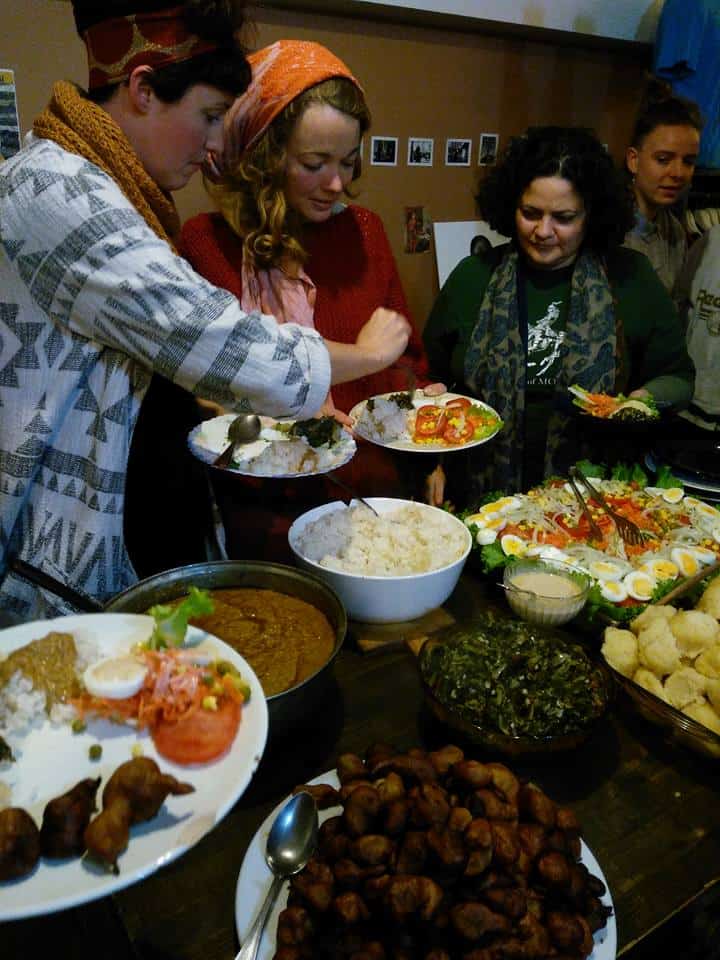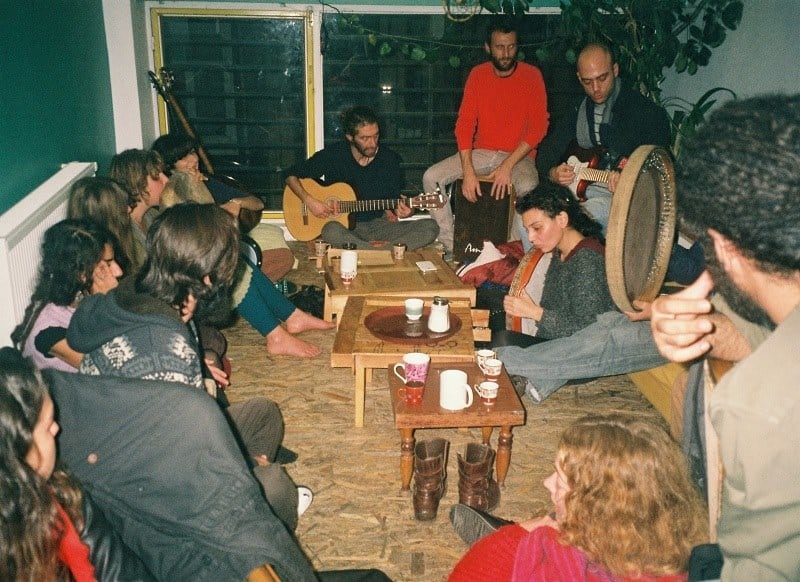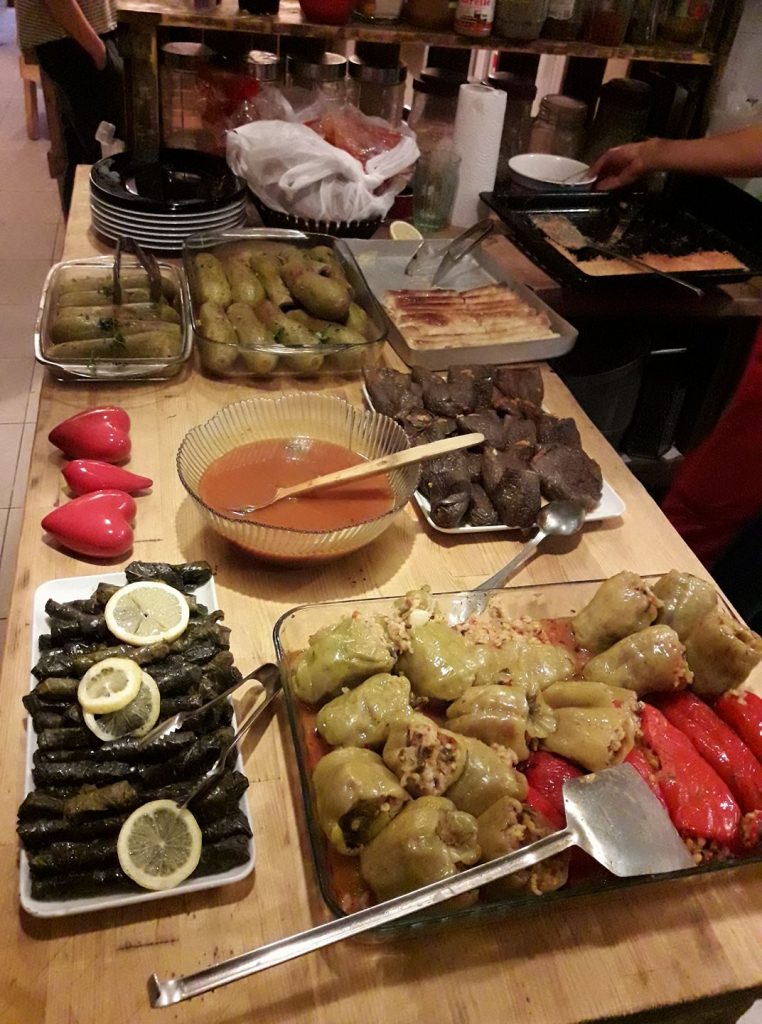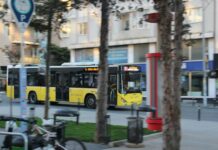Walking up the hill from the port of Kadıköy on the sleepy, predominately residential street of Uzun Hafız is a hole in the wall café that is easy to overlook and walk past. Despite this disadvantage and many other challenges, the Komşu Kafe Collective have been maintaining an economy without bosses, hierarchies, meat products, or even set prices for four years and are still quite popular among both Istanbul’s youth culture and migrant travel communities. The first thing you see is their sign displaying a sun hovering above komşu, the Turkish word for “neighbor.” A rainbow flag hangs from the window and in the center of the cafe is one table with couches. Here the guests of Komşu bring their full plates to a wooden table surrounded by bright colored pillows and often sit with people they’ve just met, cultivating the spirit of solidarity. Upstairs one has the option of sitting on chairs, the floor, or reclining on coffee bean sacks. The walls are adorned with Chinese calligraphy, socialist slogans, and black and white photography. Low tables push people to sit cross legged and sometimes live musicians play their instruments and even take requests as they interact with the audience. Some guests are travelers crashing at nearby youth hostels who stumble in and witness a side of Istanbul not often described in guidebooks or foreign media. Others are locals who know the place well, believe in its mission and enjoy the vegetarian, organic fare. Others have come for a specific event or ethnic cuisine theme night, such as Kurdish or Bosnian Food Night, a concert, workshop, or film screening. Whatever the reason, a dialogue usually unfolds between people who may or may not know each other, and the dialogue is usually profound and intimate. Spaces like this are rare and precious in an economy of inflation and avarice. Yet, the fact that such a community continues to sustain itself in a city as enormous and transformative as Istanbul reflects the hope that such spaces can survive. More importantly, it also sparks the question of whether our capitalist systems and rigid, hierarchical work structures are suitable for supporting the evolution of humanity.
The right side wall is adorned by their four principle manifesto, in English and Turkish. In a blue file, the manifesto is written in several other languages. The first principle is consensus. No decision at Komşu is made by just one person. The collective members, currently consisting of Luna, Ufuk, Ahmet, Gizem, Sara, Ali, Mohammed, Nora, and Ercan (they have opted to keep their surnames confidential), make every decision as a community and no matter is settled until all members are content. The second principle establishes community solidarity. Dialogue between guests and collective members is always encouraged and any idea that does not support racism, sexism, homophobia, transphobia, or authoritarianism is welcomed. The third principle states emancipation from oppressive capitalism. Rather than establishing set prices, guests are allowed to choose how much they will pay and no one is turned away for lack of funds. (However, a certain amount is suggested and they have rent to pay just like you do, so bear this in mind when coming there). The fourth principle is one of sustainability and scrupulous business. The ingredients come from local collectives, producers, and solidarity networks, instead of large corporate chains, whenever feasible.
The Komşu Kafe manifesto states “With open minds and open ears we are looking for more communication to create a space without violence and hatred.” This is the philosophy that has kept the café and the community alive for four years. It is the emotion that breathes life and flavor into the exquisite food served at Komşu, always with a vibrant smile. It is also a profound spiritual goal that vivifies all humanity. The joy of connecting with others who share this goal is what brings people back to Komşu again and again.
On a cold Sunday night, I came to Komşu and interviewed the collective after one of their weekly meetings. What follows is an interview with six of the nine members who all contributed various sentiments, but prefer that their names not be divulged in connection with their comments. All comments are supported and corroborated by the entire collective.
What inspired this collective and how did it come together?
This café is an attempt at alternative economy. It was initiated by some people who met together and worked in Tarlabaşı. Some of them decided to try working without a boss out of the capitalist concept and see if it was possible to earn a living doing such a thing. This was back in 2013 in the middle of August. We found a place to rent that September, and opened the café in the second part of November.

Can you describe the manifesto of Komşu in your own words?
We have a system of consensus for making decisions, which is a bit different than the usual system that we have of voting which everyone knows. That system respects the majority of the people but the consensus system takes more time, and more discussing, until everyone agrees on what’s best for the community. We try our best to have a discussion and atmosphere where no one is left aside. Our manifesto also talks about our non-authoritarian, non-sexist, non-discriminatory values. It doesn’t mean the place is closed to anyone. We don’t particularly like the words “safe space”, but at the same time discriminatory actions are not accepted here. Any acts of harassment, racism, sexism, homophobia, or transphobia are not accepted. Yet the place is open for discussion. When any act happens we try to solve it on the spot. These are the kind of values that we wanted to try in our café. Now for example, after 4 years, is a good point for evaluation and to have a discussion about the value. The value can be objectively measured by money, but the value is always subjective, related to time and place and feelings. We try to cancel the split between customers and owners. If you come in there is always a conversation beginning. People ask how much they pay and we say it’s up to you, you decide. So it starts a conversation. Sometimes it’s in a good way, sometimes a bad way, but it’s an evolving experience. So that’s one of the important points for Komşu.
Can you talk about your philosophy around food?
Here we have the advantage of being a multinational community. That brought us a combination of food from different places. Usually the events come from some friends who come from outside or actually any people who stumble upon the place and want to cook here. But each one of us comes from a completely different culinary background. We try to put that on the table for the people. We try our best not to abuse animals so our food is vegetarian, and about 80% of the time it’s completely vegan, although we don’t name ourselves as a vegetarian or vegan café. But we made this decision to not cook meat and always try to prepare some vegan options. We also try to make a network with the alternative providers. There are some difficulties with this aspect due to alternative products being not so easily reachable or accessible. Sometimes too expensive. But we do have some relationships. We sell olives and other products on the shelves only for the purpose of trying to help our providers. We are an open space for anyone who has any creative ideas or events, anyone who wants to have a meeting or show us anything. They can benefit from coming to the place as we can benefit from having them here.

How are your events planned?
Some events are needed for a certain time period we’re passing, so we plan them accordingly. Others are proposed to us throughout the week. Each person proposes events and the collective meets on a weekly basis to share ideas for the week, and then we decide on which to choose. Sometimes some travelers come and cook things for the night or on the weekends. Sometimes we decide we need to make an event this week and whatever ideas come we use. We are not a part of a political agenda or a certain political existence. But we do feel that what we are doing in itself is a political position. We also try to be creative and capture people’s attention, with things such as movie screenings.
What accomplishments are you proud of?
Surviving for 4 years! Especially as an alternative economy. A few days ago we celebrated our fourth anniversary. And we plan to keep on going. A lot of people have joined us, and a lot have left. Always changing and morphing. It’s a connection from all around the world in one place, a story we tell. It’s wonderful that we’ve brought so many people together. For some of us in the collective our lives in Istanbul have started in and around Komşu and it has taken us to so many places in Turkey. So we have managed to connect a lot of people and a lot of travelers. We are also proud of our stuffed pumpkin!
What are some future plans that you have?
Ideally, to open other branches of Komşu in different cities. That’s our dream. Seeing them or something similar and support other collectives to come to life. But technically now we are focusing on helping this place to survive. Soon we will be starting a fundraising campaign for the place. For that we will need the help of all our supporters. Because all other alternative economy places have been closing. It’s not easy to maintain so we will need a lot of support.

How can people get involved and support Komşu?
There are many ways one person can support the place. Simply by coming to the café and contributing here and being not our customer, but our guest. Another way is to help us organize more workshops or more events if people have something interesting to bring to the place we would love to share it. Other ways would be supporting our upcoming fundraising solidarity campaign. Most of the events we have are solidarity-based, whether for us or for other people. So that’s another way to contribute is to come to these events. And by supporting all alternative economies and changing your lifestyle in regards to alternative things you are helping to support this network because we are all connected. For example, if you’re eating olives from us, you’re not only helping us but also the collective that grows the olives. And by buying the coffee here, you’re not only helping us, but also the coffee growers.
Komşu Kafe Collective is located at Uzun Hafız Sok. 83/A in Kadıköy. To get there, take the Asian side metro, ferry, or bus to Kadıköy. To keep track of their events, including ethnic cuisine theme nights, concerts, workshops, and film screenings, subscribe to their Facebook page.
[geo_mashup_map]









